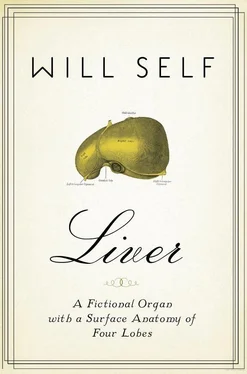The Christmas before last Isobel had brought home Hilary, the club’s proprietor, who, although not nearly as inter-sex as his name, was an obvious pansy . He drank the best part of a bottle of brandy, while remaining perfectly polite. Isobel, quite gone on him , had done for the rest.
Hilary had then wet the bed in the spare room, and at 6 a.m. on Boxing Day morning Joyce came down to find Isobel in the utility room, sponging the mattress while the sheets moiled in the washing machine. ‘Why?’ is all her mother had said. ‘Why can’t you do this for yourself?’
These bitter ruminations occupied Joyce while her daughter completed the check-in formalities: dealing out her mother’s credit card, copying out their passport numbers. The receptionist was no flinty-eyed Alpinist but a black-haired chap with sallow skin. He glanced once at Joyce, verifying that she existed, and she thought he knows : his sallow skin spake unto her jaundiced one.
The Widder was a terrace of old houses that had been knocked through by architects armed with steely beams and chequered marble tiling. The corridors morphed into walkways that traversed glassed-in cists; at the bottom of these were hunks of masonry, preserved under spotlights. Stylish . Isobel led her mother here and there, her heels clopping; she’d declined the services of a porter, then got a little lost finding the lift.
Joyce’s stylish room was at once frigid and stuffy. There were four broad windows on the street side, and opposite them blond-wood cabinets with glass doors and mirrored shelves. In the seating zone, at one end of the long, squat room, shone the cold puddle of a mirror-topped coffee table. There was a mirror-topped desk cascading in the middle of the room; beyond it the white bed had a mirrored headboard. With impersonal funerary goods laid out for its occupant — chocolates, wine, fruit and flowers — Room 107 was an awful box in which to be penultimately alone.
Joyce watched her little old lady body totter into the bathroom. Then watched some more as she turned on the taps and slumped on the toilet; she watched herself take a quarter of an hour to struggle out of her reeking clothes, then roll her yellow body into the yellow bath.
Isobel kept calling: it made her anxious to be shut out. Nervous of what? She can’t be afraid that I’ll die? Joyce lay in her favourite nightie, cold in the bed, the phone’s receiver beside her on the pillow: love reduced to a black plastic dildo. Would it , Joyce wondered, shock my bohemian daughter to learn that I’d once used one?
It seemed unnecessarily cruel to Joyce that these last few hours of her life should be spent not simply alone but divorced from anyone who had known her as truly vital, properly sensual; anyone who had touched and held her. That’s all I want , Joyce gripped the black rod, to be held one more time. I don’t even care who it is. Just held.
‘Have you taken a sleeping pill, Mum?’ The receiver resonated with tinny concern. ‘Or morphine?’
For want of anything better, Joyce had taken both. Not that she really needed the painkiller, but in the last fortnight she had discovered that it dulled the anxiety of falling to sleep. Without the temazepam she couldn’t sleep — and with it her narrowing vision was a catacomb hung with wind-dried cadavers, leading to a dark plain strewn with skulls.
‘I’m all right, Isobel,’ Joyce whispered. ‘I just want to sleep now, please. Please let me alone.’
Why did she begrudge her only child any reassurance at this late hour? Why couldn’t she be a good mother? True, it had been difficult to get between Derry and Isobel — who’d been every bit as close as loving father and only girl child should be — but it was Joyce who had sewn the name tapes, put the dinner money in the envelope and been there to comfort the cygnet in tutu and tights when she cried because she didn’t get the part.
It was far too late for a re-evaluation of all this now. The gap between the narcotics was getting narrower and narrower. Joyce could no longer see the telephone; her visual field was a cranny, in which lay the Cartier watch Derry had given her for their twenty-fifth wedding anniversary, a digital clock, the plastic tub of pills with her name tape sewn on to it , the brown bottle labelled ‘Oramorph 5 mg solution’, the bedside lamp — a clear tube, its filament a glowing worm — the window, which was ajar.
From the street below came the click of well-shod feet over the cobbles and the chesty cough of Schweizerdeutsch. Joyce had supposed — what? That she might venture out? That she and Isobel would visit the Fraumünster, admire Chagall’s stained-glass windows? Then, later — what? A heavy meal in an oak-panelled restaurant, a plank of beef with a knob of butter on top?
After the spat they’d had about the hotel — and Joyce’s troubled concession — she’d read the guide. So she knew what to expect from Zürich: well made, orderly — pretty, almost, with its setting between wooded hills and either side of the Limmat, the swift little river that flowed into the long lake. The Zü richsee, with its pleasure boats, its bathing beaches, and its islets hollowed out by reclusive millionaires.
Zürich, Joyce gathered, was a country town masquerading as a global financial capital — or perhaps the other way round. At any rate, here the deep, cold current of money was obscured by surface ripples of tepid liberality, while the Zürichers hid their avarice beneath polite masks.
The benzodiazepine stroked Joyce’s frontal lobes, the morphine caressed her cortex. In the cranny, the red numerals on the digital clock blinked from 14.18 to 15.18.
Zwingli, preaching at the Grossmünster, sways gently in a long black robe, his pale face uplifted to a vertical beam of still paler light.
Baptism is a covenant between God and Man, he says, making of faith a contract; it’s a notion that appeals to the hard-nosed burghers who sit in the pews. The sacrament is symbolic, Zwingli says, a memorial rather than a re-creation. Again, this recommends itself to the Zürichers, geared into time’s progress as they are, the ratcheting of moment to moment. As for music in church — isn’t it the most obvious distraction, Zwingli asks. Why, you’d never countenance a lutenist in the counting house, or a drum being struck in time to the heavy beat of the coinage, now would you?
This, too, the City Fathers swallow — because he’s a charismatic fellow, this priest, his holiness as unimpeachable as his own instrumental talents — for he can play like an angel upon the flute and harpsichord. At the same time as he preaches against liturgical music, Zwingli cannot prevent his angular frame from swaying in its natural spotlight.
Ba-ba-ba-ba-baaa. Babba-daaa. Zwingli swings. What were they called? The girls with long, ironed-down hair, the men in matching roll-neck pullovers. The Swingle Singers, that was it — but that was later, on Top of the Pops , in the bright fuzzy fog of black and white television. I want earlier — the skiffle night at the Locarno Dance Hall. Derry said it wasn’t real music, but, preachy as he was, he still liked to swing me around, crackling handfuls of crimplene. Later, cocoa at the Kardomah on New Street. Later still, smuggled past his landlady into his bedsit, the tremendous gift of his hands. Kyrie eleison. Christe eleison.
14.21. Joyce slept. Half an hour later the pass key turned in the lock and Isobel tiptoed in. She leant forward at the head of the bed, holding her dyed-blonde hair to her neck, and listened to her mother’s monochrome breathing. The porter stood in the doorway, massively indifferent in his striped hotel livery.
Читать дальше












